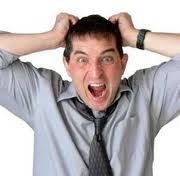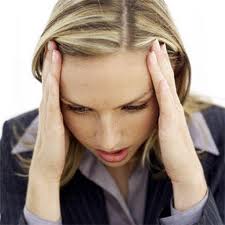Navigation
Hair Loss and Stress
Stress a modern day problem can be blamed for all types of illnesses, and hair loss is no exception to this. Introduction Your hair has a way of telling you if your body is in balance. If you are healthy - physically as well as emotionally - your hair will be radiant and shining and your scalp pliant and moist. If you are not well physically, or if you are upset emotionally, your hair becomes dull and lifeless - it will begin to fall out, and your hair will become waxy with the overproduction of your traumatised sebaceous glands. Truly, any major change in our lives can be reflected in the condition of our hair, scalp and skin. If we are well and happy, we reflect this health and well-being in the condition of our hair and scalp. If we are in a slump, that slump is often manifested in the appearance of our hair and scalp. We need stress, we need it to become vital, ambitious and sexually active people. However we also need the ability to cope with stress when it threatens to overwhelm us. Besides which without stress, we would become lethargic and depressed. Defining Stress Stress is very difficult to describe, few people will say the same thing about it and very few people ever agree what causes it. The Oxford dictionary's definition of stress is "that stress is a demand upon physical or mental energy". However what we usually mean by stress is an excessive demand upon our energy, one that we find hard to cope with, which calls on our reserves and which cannot be sustained indefinitely without relief. Stress appears to be a product of modern day life, however it was in existence centuries ago, although it did not have the same press coverage it demands today. Stress can be defined in a variety of ways: Stress is feeling bad, due to troubles beyond our control. The reaction of the mind and body to change. Stress is everywhere and seems to be a recent phenomenon. Stress is unpleasant and has little to do with happy events. Stress is related to change. There again you could reject all of the above and say stress does not exist but is merely a scapegoat for all of modern day problems! Cure The best possible way of reducing stress is to identify the cause and remove it. This is not always possible but if you do know the cause of stress and you do not try to do something about it, you will only succeed in increasing the problem. Thus causing you to become more stressed!! Work and money problems are two of the bigger problems of stress. One of the best ways of helping to find and cure the problem is to devise a list of all your problems and try to resolve all the items over a certain time span. Stress can be habit forming and, as such, it is often triggered without thought. Worrying about whether you will lose your job, for instance, is an example of a stressful situation that may be triggered by groundless fears. It is important to recognise such substance less anxieties for whatever they are, for although the situation is imagined, the consequences are real. Rumours to the contrary, there is little concrete medical evidence that stress - regardless of its origin - actually contributes to balding it just seems that way. However this statement could be applied to any condition that may be blamed on stress and even though it is not directly the cause of the problem, hair loss does appear to be a side effect of stress. The truth of the matter is that when we are under stress, we let our basic health habits go. Just think about this. You have a deadline to meet for an important project at work. Your boss has virtually told you your job is on the line. How do you react? First of all, you start drinking more coffee and soft drinks than usual, and if you're still a smoker, you start smoking more than ever. By doing this, you increase the poisons from nicotine and caffeine in your body, taking in far larger quantities than when you are not under such pressure. Then you work all hours, rushing into work without breakfast in the morning, and if you eat lunch at all, you gulp down some fast food from a take-away. You get no exercise, other than rushing from place to place and sleep irregular hours. More than likely, you don't pay a lot of attention to your face, you may touch it with inkstained hands, you run your fingers through your hair and then rest your chin on your hand, transferring the oils and dirt from one to the other. You give your hair a quick washing, paying little attention to conditioning or rinsing, if you wash your hair at all. In no time your skin becomes shallow and sensitive. Your hair becomes dull and lifeless, and before you know it, it is falling out in bunches. This is not caused directly by stress, but by what you have done to your body while you are under stress. Your hair is one of the first places your body shows distress. Illness, medication and imbalances in nutrition all show up in you hair and scalp. Even aspirins and over the counter allergy pills or cold tablets can have a negative effect on your hair, especially if your hair is chemically treated with colour or a permanent rinse. However as we have already seen when we are excited or frightened our hair can actually stand on its end, thus showing how our nervous system is interrelated with our hair and skin. So if we can do anything to reduce stress it can only do us good. There is quite a lot of evidence to show that a moderate degree of stress can be good for us - it improves performance, efficiency, productivity and many people strive on it. Indeed there are people who need stress, and function at maximum efficiency when they are under stress, but they are rare. For most people, if stress goes beyond a certain point, everything disinteregates, and this can lead to both mental and physical illness. It is therefore, very important for us to come to terms with what causes stress, to recognise the part that it plays in our health, or, conversely, ill health, and try to find out how we can get rid of it or cope with it. The most important thing of all is that you cope with stress, it's much less important how you cope with it. In the long term, however, you must teach yourself to handle stress positively. One of the problems in a high stress situation is that your self-confidence is reduced. You remember your failures, think of your inadequacies, you become negative, when you really need to be positive. Positive thinking itself can be a great healer and can achieve remarkable results when used properly. If stress can't be avoided, try one or all of the techniques listed below. Dissociate This means putting your worries out of your head. Some people can do this easier than others. Try to ignore the problem for as long as possible, the longer you ignore it, the more time there is for the body's fight and flight reaction to lessen, thereby reducing stress and anxiety. Have Fun Go out and enjoy yourself, laugh and have fun, go to parties and cheer yourself up. While you are having fun, and even after, you will notice how most problems will diminish in size. Physical Activity Work off stress through any type of exercise that you enjoy and are physically able to do. Physical activity of any kind always counteracts the effects of stress and will usually leave you feeling relaxed and rational about your problems. Relax Relaxation is a great way to fight stress. Try to lie down in a quiet place for twenty minutes each day in a darkened room, let nothing disturb you and just concentrate on feeling good about yourself. Another good exercise is to try to get ten hours sleep each night for a whole week. If you can manage this for a complete week you should feel a whole lot better. Problems with work, money and daily life in the nineties are taking its toll and some of the symptoms show themselves in different ways in different people. Unfortunately one of the most common symptoms is excessive hair falling out and general thinning. This problem is not unique to men, the symptoms can affect females just as easily. Reducing stress is easier said than done but some of the causes and cures are outlined below. The focus of stress is often in the mind rather than in the body. There are many ways in which stress can show itself. It is particularly difficult to adjust to severe changes if they catch us unprepared. Exercise Exercise is a particularly effective way to relieve stress, it keeps your body fit and able to cope with stress more easily. Try to participate in a sport or activity that you really enjoy and give it your full concentration. Relaxation To have a period of relaxation where you turn your mind off to everything can have a very therapeutic effect. Try and lie down in a darkened room for half an hour a day with no disturbances and no sound at all. As you are lying there just try and think of nothing or only good things that have happened to you, it will take a while to get used to doing nothing for half an hour but the benefits will be noticeable to you. Stress can be relieved by slowing down rather than speeding up. Slowing down can be achieved by talking to people, taking pills, learning to relax, doing special exercises such as yoga and meditation, having a holiday or just taking it easy for a couple of days. Sleep Relaxation and exercise will also help you sleep at night. Everyone knows how much sleep they need, so try and get it. Too little or too much sleep affects our lives, leading to health problems and the results can cause deterioration in the appearance of your hair and skin. Diet Just as the residue from drugs and medication and all the other negative things that we put in our bodies show up in our hair, the positive results of nutritional care are evidenced there also. There are no magic pills we can take or miracle foods we can eat to have healthy hair, but we can feed our hair and scalp by eating the foods that promote physical health and well being. We must achieve a balance among the essential nutrients, protein, fat and carbohydrates, as well as vitamins and minerals, to achieve a healthy, balanced body. We need to eat a variety of foods in each of these groups for maximum health. Only one-fifth of our daily protein intake should come from meats, including fish and poultry. Other minerals that contribute to full rich hair are zinc (in mussels, nuts, brewer's yeast, wheat germ and whole grains) iodine (in seafood, sea salt and onions) and sulphur (in eggs , fish, garlic, onions and cabbage). Avoid foods that are high in oils and fats - red meats, fried foods, most nuts and nut products - and limit your intake of shellfish and iodised salt because they contain too much iodine. Iodine does help hair growth, but too much can cause acne. Chocolate and cocoa product, cheese, sugar, coffee and tea, as well as alcohol, should be eliminated or at least restricted, because they can trigger systematic problems that upset the delicate balance between your hair and its environment, the scalp. The chemical content of the hair is so drastically altered by pollutants that the real nutritional effects of the diet can be lost unless we can reach and maintain that wonderful, delicate balance. 


